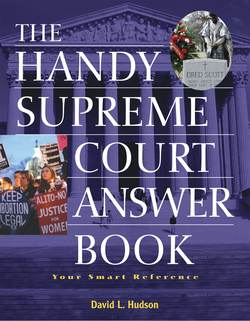Читать книгу The Handy Supreme Court Answer Book - David L Hudson - Страница 211
На сайте Литреса книга снята с продажи.
What did the Court actually rule in Marbury v. Madison?
ОглавлениеJohn Marshall, now chief justice of the Supreme Court, noted that Marbury was entitled to his commission, as he had been appointed by the president, confirmed by the Senate and otherwise qualified for the position. The Court also determined that Secretary of State James Madison wrongfully withheld Marbury’s commission from him.
However, Marshall also ruled that Marbury’s suit must fail because Section 13 of the Judiciary Act of 1789, which authorized the Court to issue a writ of mandamus, was unconstitutional. Marshall reasoned that Section 13 conflicted with Article III of the U.S. Constitution, which provided that the Supreme Court did not have original jurisdiction of Marbury’s case, only appellate jurisdiction. In other words, Marshall reasoned that Section 13 was unconstitutional because it attempted to confer original jurisdiction to litigants like William Marbury, but the Constitution provided that the Court only had appellate jurisdiction, meaning the suit had to be filed in the lower courts. Marshall explained that “the jurisdiction had to be appellate, not original.”
CourtSpeak: Section 13 of the Judiciary Act of 1789
“SEC. 13. And be it further enacted, That the Supreme Court shall have exclusive jurisdiction of all controversies of a civil nature, where a state is a party, except between a state and its citizens; and except also between a state and citizens of other states, or aliens, in which latter case it shall have original but not exclusive jurisdiction. And shall have exclusively all such jurisdiction of suits or proceedings against ambassadors, or other public ministers, or their domestics, or domestic servants, as a court of law can have or exercise consistently with the law of nations; and original, but not exclusive jurisdiction of all suits brought by ambassadors, or other public ministers, or in which a consul, or vice consul, shall be a party. And the trial of issues in fact in the Supreme Court, in all actions at law against citizens of the United States, shall be by jury. The Supreme Court shall also have appellate jurisdiction from the circuit courts and courts of the several states, in the cases herein after specially provided for; and shall have power to issue writs of prohibition to the district courts, when proceeding as courts of admiralty and maritime jurisdiction, and writs of mandamus, in cases warranted by the principles and usages of law, to any courts appointed, or persons holding office, under the authority of the United States.”
